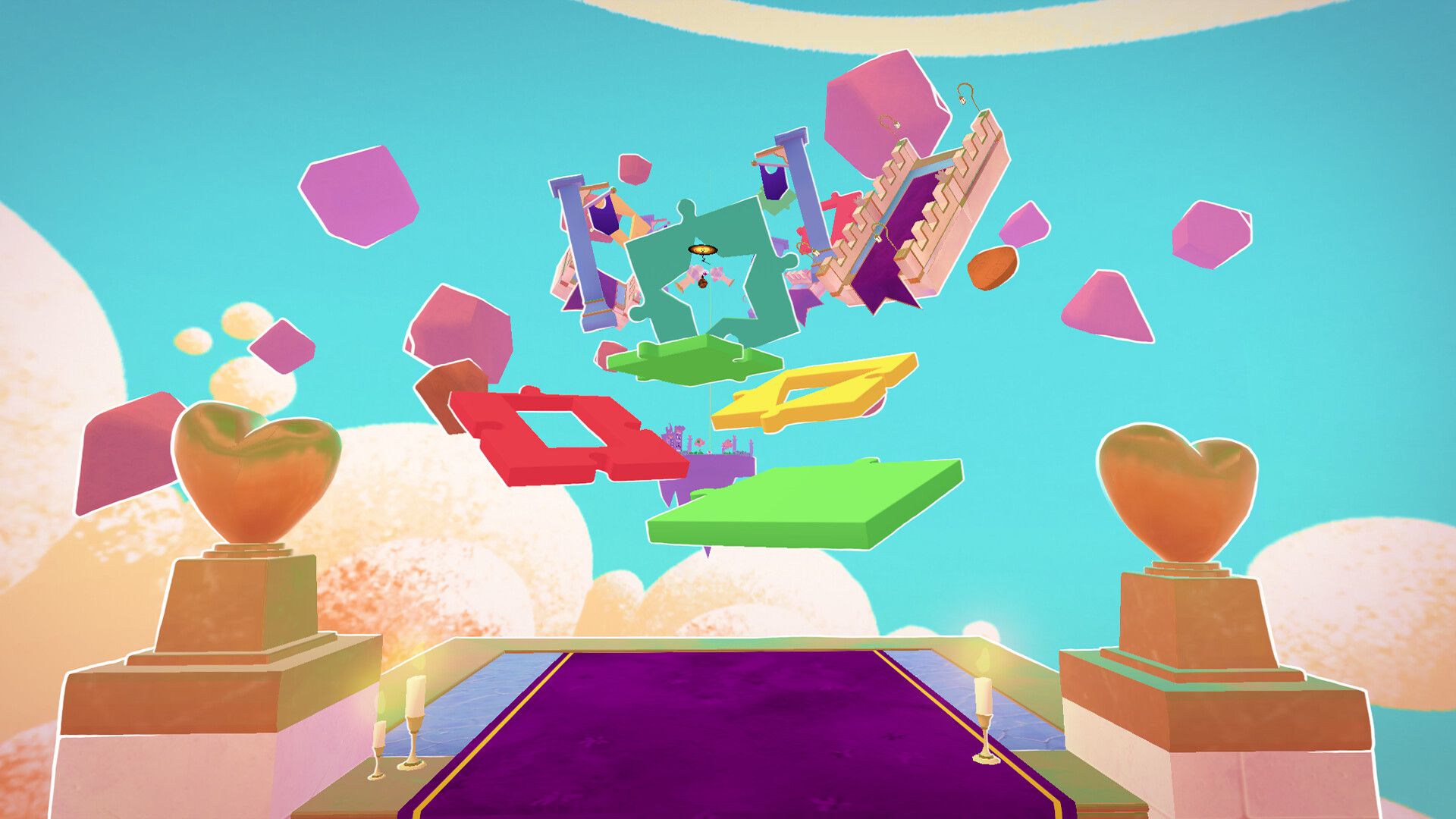There is something comforting in the humble platformer.
Across the decades, gamers have spent hours perfecting the simple art of jumping from platform to platform, manoeuvring past rotating obstacles and leaping over projectiles in droves. From the halcyon days of Super Mario to more modern iterations like Ori and the Will of the Wisps, gamers have amassed countless hours in this delicate ballet of timing and dexterity.
Platforms: Quest 2, SteamVR (Review conducted on Quest 2)
Release Date: Out now
Developer: Squido Studio
Price: TBC
Yet despite the unmistakable allure of the genre, the most prominent VR platformers feel closer in nature to their flatscreen counterparts. Titles like Lucky’s Tale or Moss see your headset become akin to a monitor and camera combined, allowing you to inhabit an immersive view of the world while controlling a platforming protagonist from the third-person.
That style of VR platformer can be masterful in its own right, but still doesn’t truly make the most of the physicality afforded by the medium. That’s where No More Rainbows comes in.
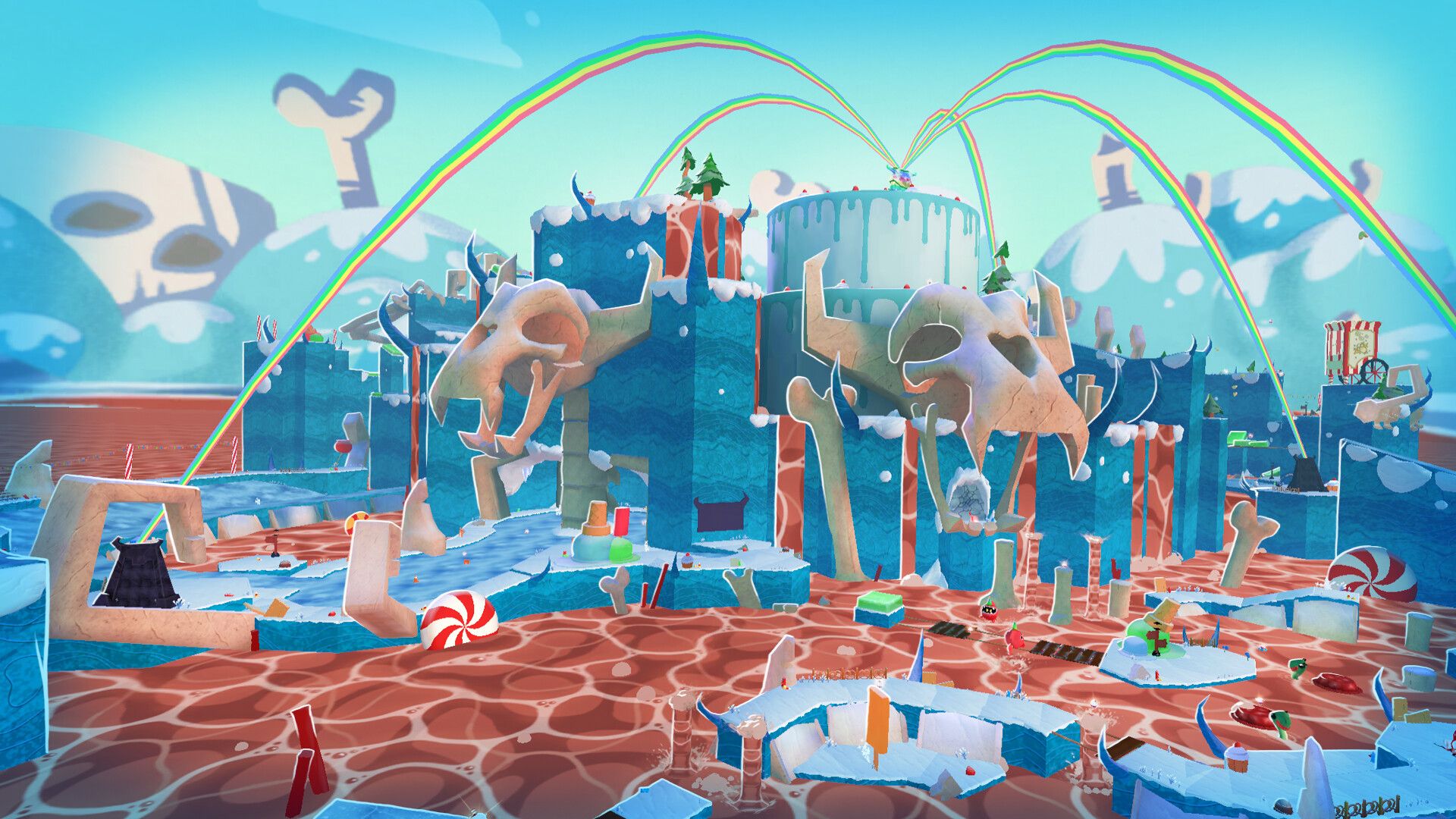
Monstrously Good
No More Rainbows is a first-person adventure that uses an intuitive Gorilla Tag-like movement system as a basis for VR platforming, challenging the player to leap across a world of traps and obstacles.
No More Rainbows wastes no time in delivering the player directly into the action. The player embodies a gruffly-likeable monster who awakes to find their once grim and lava-filled realm infested with overly cute, rainbow-spewing creatures. Once confronted by the game’s antagonist, a silently-mocking uber cutie who escapes through a portal, the adventure begins.
The lava-infused starting area acts as a hub, housing portals linking the four worlds that make up the bulk of gameplay. Each world subsequently acts as a uniquely-themed hub world of its own, containing further portals to the actual levels that make up the campaign.
Far from just interactive level selection areas, the hubs themselves offer increasingly challenging platforming sections that help introduce and teach new mechanics across the campaign. These interim areas not only act as organic extensions of the tutorial, but even offer some of the most challenging and rewarding platforming sections of the game – a testament to the developers’ thoughtful design choices.
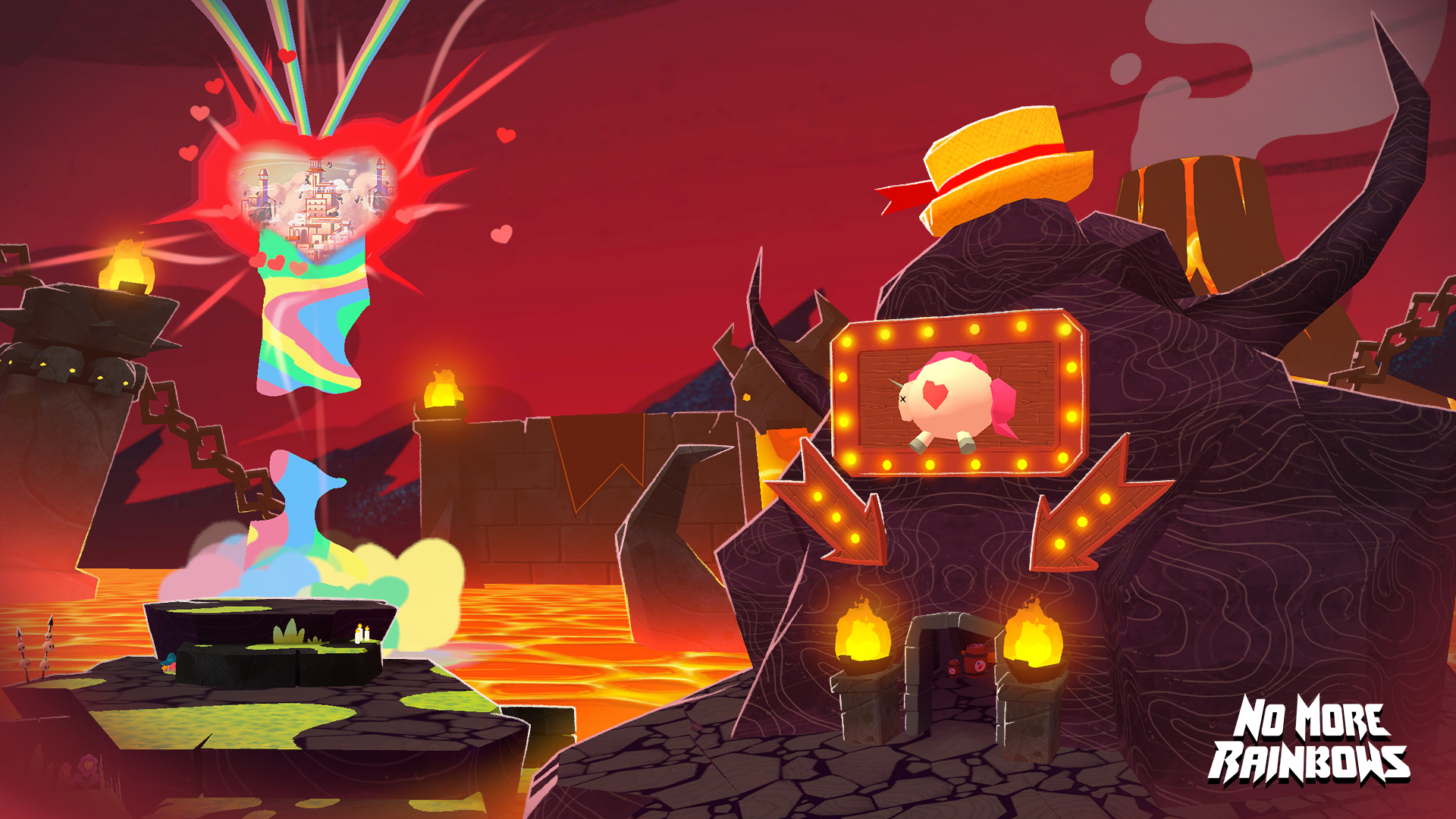
Monkey Business
At the heart of No More Rainbow’s gameplay is an intuitive movement system similar to the one used in the mega-popular multiplayer phenomenon Gorilla Tag. The player propels themselves through the world with their hands, vaulting off the ground and around the environment using synchronised gestures from both hands. The movement system is simple but nuanced, and a perfect fit for the genre.
With practice, you can expertly temper the direction and force of your vaulting motions. You’ll need pinpoint accuracy and precision to overcome the various obstacles, and the developers deliver a responsive movement system that is up to the challenge.
As you progress, a cavalcade of classic platformer tropes emerge for the player to evade. From moving blocks to crumbling platforms, No More Rainbows has it all. Most importantly, it all works perfectly. The heady platformer blend of satisfaction and frustration exists in force throughout the campaign. There’s a base joy to be found in successfully navigating the challenges – more than any other VR game in the genre, No More Rainbows really makes it feel like you beat the level.
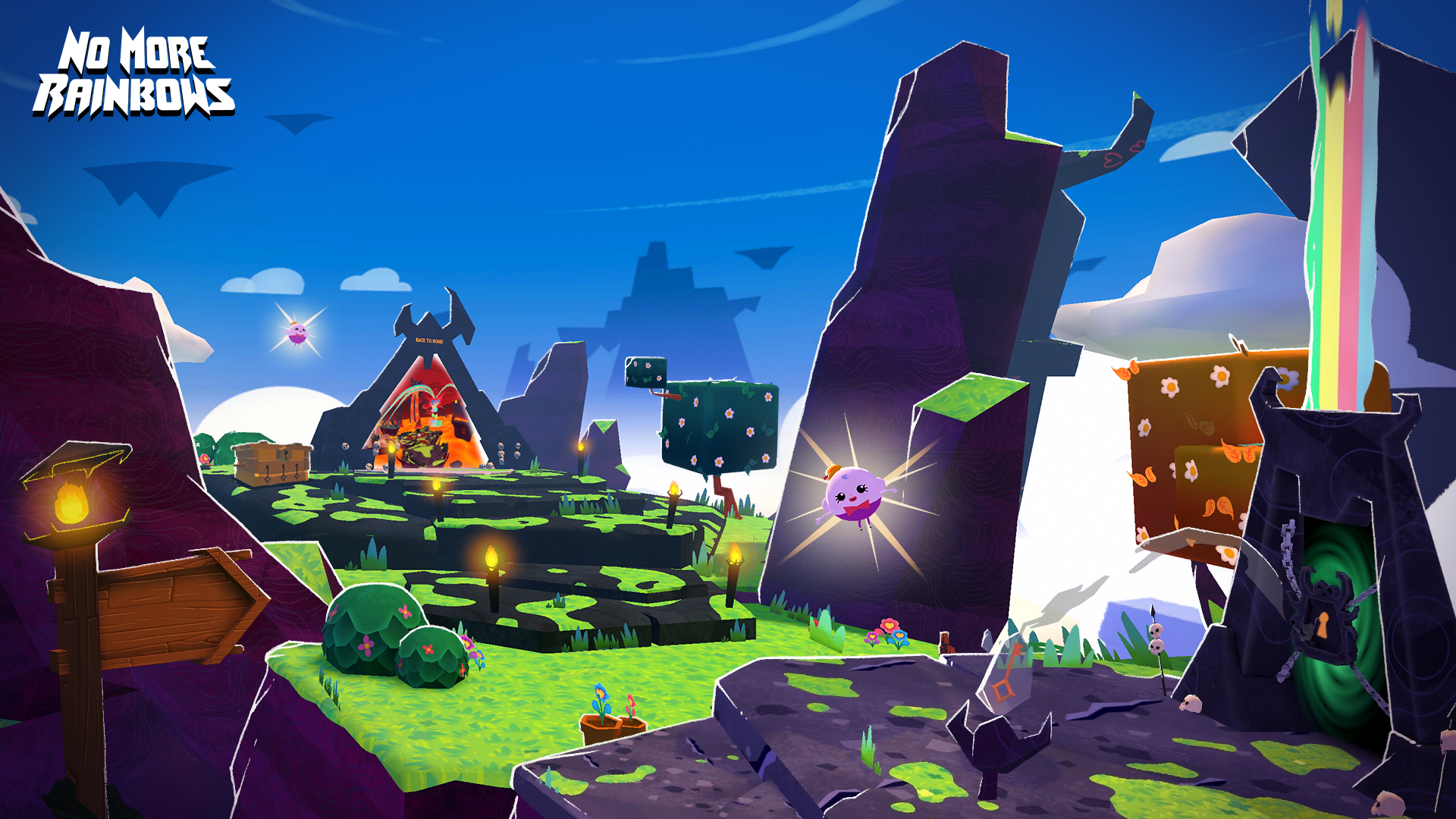
Just One More Try
No More Rainbows steadily introduces new mechanics and obstacles to keep the gameplay evolving over the 4-5 hour campaign, with the difficulty curve progressing at a balanced rate. There are no “lives” as such – players are free to die as many times as needed in order to beat the course.
Each failed attempt will see the player reset at the last checkpoint within seconds, and should it get too much, you can switch to an easier mode at any time. The levels play the same, but checkpoints are administered much more frequently. It’s a fantastic option that mitigates the risk of any particular level or section becoming so frustrating that you put the game aside (or hurl a controller) in anger.
No More Rainbows also offers leaderboards, with top positions awarded based on time, as well as challenge points for collecting hard-to-reach collectables. These feel far from flimsy additions to stretch the gameplay – completing a level is one thing, but mastering the physical movement required to do it in record time is a completely different experience that adds a lot of depth.
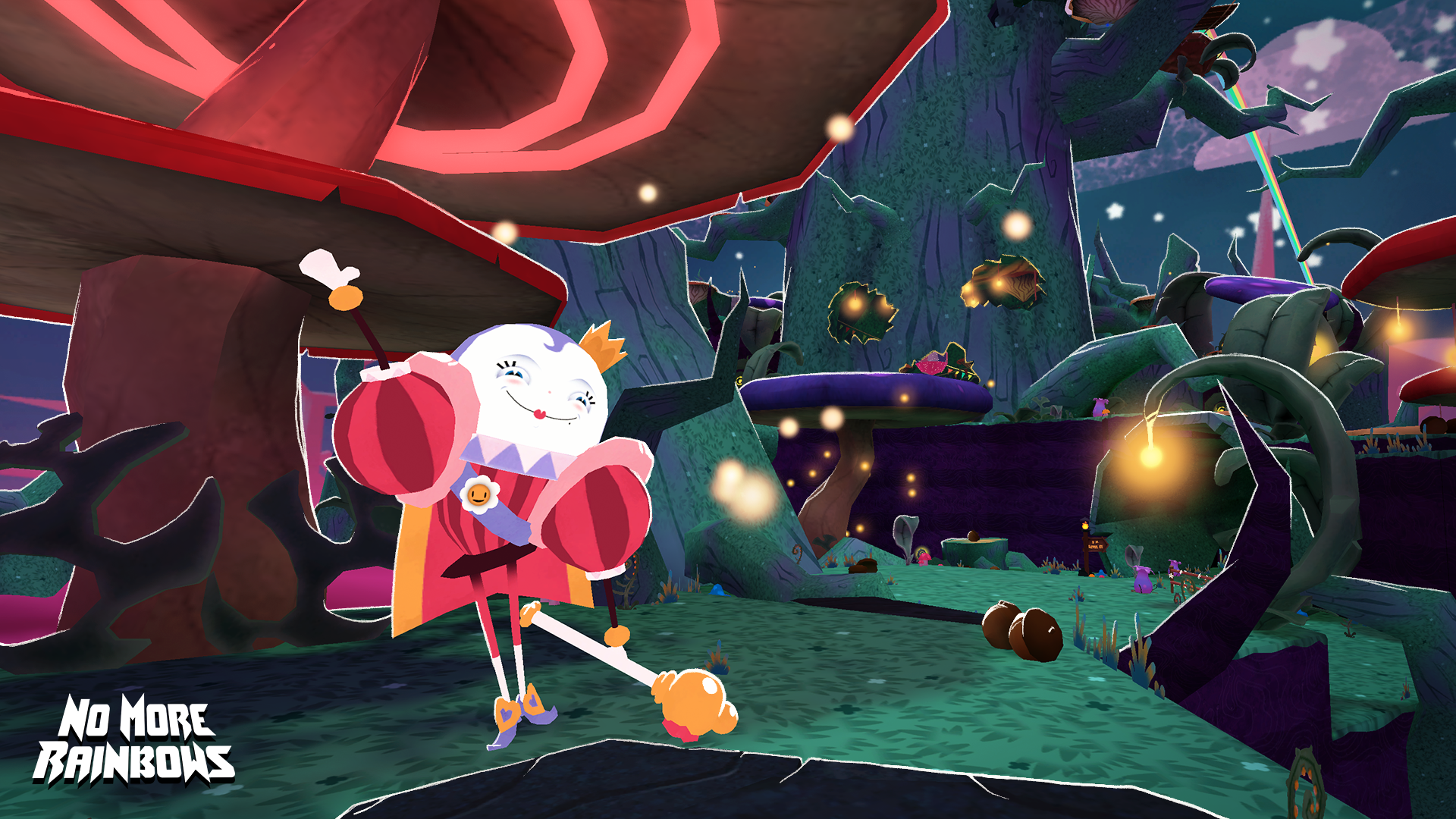
So Bright You Can Hear It
No More Rainbows exudes a vibrant cartoon style with clear and consistent art direction. The invading hordes of saccharine ‘bad guys’ are appropriately vivid, as is the rainbow infection that they bring to the otherwise dark and grungy homeland. This clear visual language makes every element easy to understand, no matter how quickly the player careers through it. Depth and distance are also well realized and easy to interpret – an essential for first-person platformers.
The different themes for hub worlds and levels keep the platforming versatile and prevents feelings of repetition from settling in. The world is littered with pleasing visual flourishes that give a sense of character. Moments where you stumble upon a group of marshmallow folks holding a rave or sitting down to a formal dinner lend a surreal authenticity to the bizarre cartoon world.
From an audio perspective, everything on offer in No More Rainbows is entirely functional, if slightly underwhelming. The score is thankfully innocuous, blending into the background and allowing you to funnel focus to the more onerous matters at hand. Together with the sound effects, it all works together easily to support the sense of character without becoming a distraction.
That said, this is a world with no dialogue at all, only occasional grunts and squeals from the characters. The overall soundscape does sometimes feel slightly barren as a result.
No More Rainbows – Comfort
No More Rainbows is prescriptively based around a unique arm-based movement system for traversing the world. The physical arm movement might help quell nausea for those who are prone to it, but the game is built around a free locomotion movement system – offering a teleport option simply wouldn’t be possible. Some basic vignette comfort options are provided, but those prone to VR motion sickness should take care.
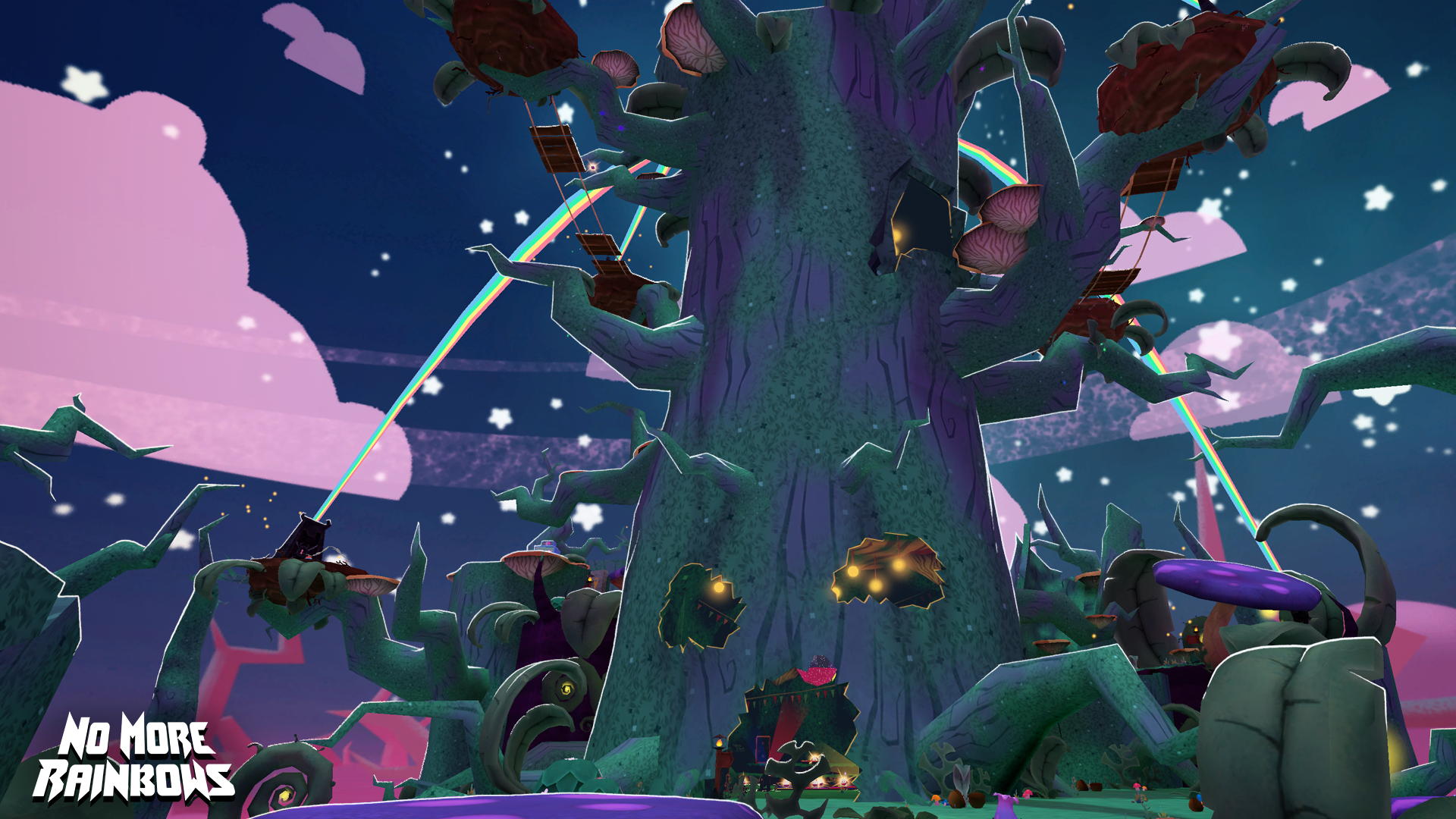
It Takes Six To Tango
Surprisingly, Squido Games also managed to conjure a thoroughly entertaining multiplayer experience in No More Rainbows. The multiplayer mode comes complete with its own small social hub world, including a range of simple mini-games to play. The main multiplayer mode sees two teams of three monsters facing off across a number of beautifully-designed platform arenas, competing to chase down a series of floating chickens to score points.
Power-ups are dropped in throughout the sessions, which add perks like scoring buffs and basic weaponry. It sounds simple, but is tremendously good fun, largely due to the creativity and detail in the level design. Far from an afterthought, these arenas are as carefully produced as the single player campaign levels.
Due to the pre-release access of my playthrough, I was only able to play the multiplayer mode in some 1v1 games. However, if my limited experience is any indication, then No More Rainbows could be the multiplayer game that no one knew they needed. Even when playing against one other player, it was great fun – I can only theorise on the level of team strategy that will come to play in a live server with six players.
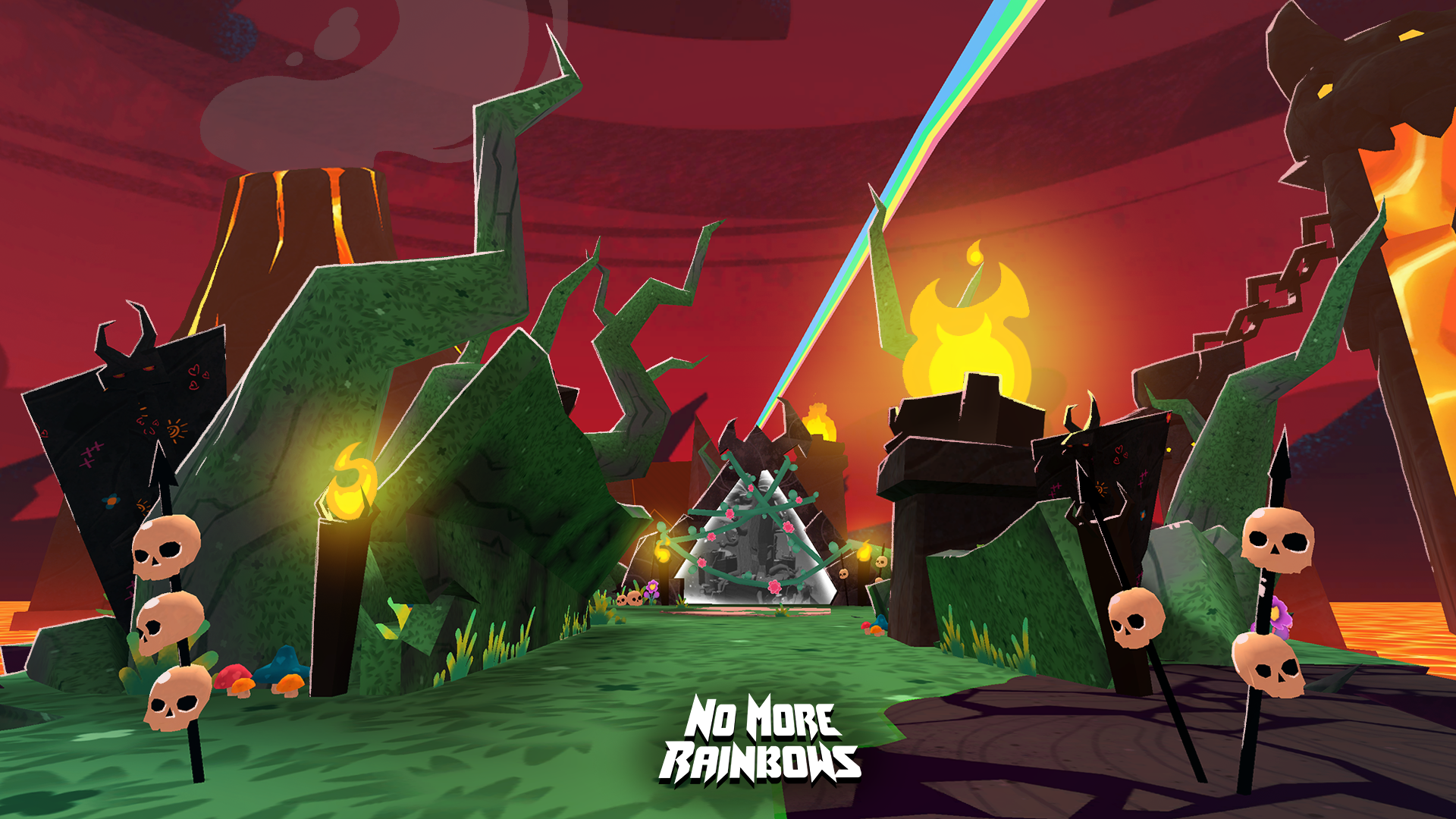
No More Rainbows Review – Final Verdict
No More Rainbows takes the classic platformer and brings it crashing into VR in a way that is both innovative and familiar. The excellent mechanics truly capitalize on the physicality of VR, matched with a solid campaign and a creative (and exhausting) multiplayer mode. Squido Games delivers a breath of fresh air for the Quest platform, reinventing the humble platformer in a way that will no doubt become the genre’s benchmark in VR for some time to come.

UploadVR focuses on a label system for reviews, rather than a numeric score. Our reviews fall into one of four categories: Essential, Recommended, Avoid and reviews that we leave unlabeled. You can read more about our review guidelines here.
